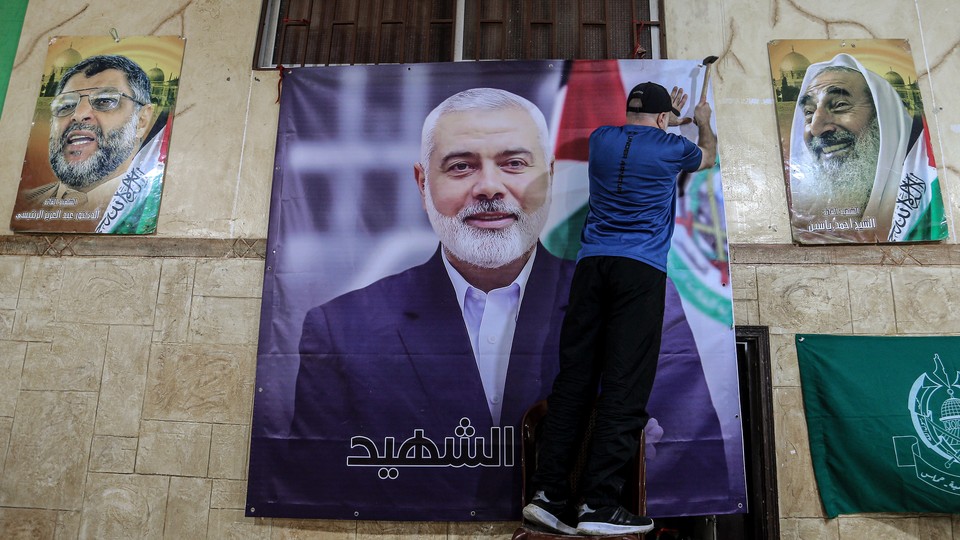Ismail Haniyeh’s Assassination Sends a Message
4 min read
Early this morning, Iran’s Revolutionary Guard Corps announced that someone—no points for guessing who—had fired a projectile into the temporary bedroom of the Hamas political leader Ismail Haniyeh and killed him, along with an Iranian bodyguard. Haniyeh was in Tehran for the inauguration of Iran’s new president, Masoud Pezeshkian, and after the ceremony the two could be seen in a collegial, I-look-forward-to-working-with-you embrace. The tone of that ceremony was itself spoiled by the news that an apartment associated with one of Hezbollah’s senior leaders, Fuad Shukr, had been blown up, possibly with Shukr inside. He was, according to Israeli and U.S. sources, the official responsible for the killing of a dozen Druze children in the Golan Heights on Saturday and played a central role in the killing of 241 U.S. military personnel in Beirut in 1983.
The James Bond creator, Ian Fleming, famously wrote that once is happenstance, twice is coincidence, and three times is enemy action. I think in this case twice is sufficient to conclude that Israel was very busy in the past day or so, and that the fruits of its labor demonstrate a formidable ability to infiltrate its adversaries’ strongholds. Shukr was targeted not on a dirt road in southern Lebanon but in Beirut, an urban stronghold where Hezbollah chiefs feel relatively safe. They had declared that attacks in south Beirut would cross a red line.
Until a few hours ago, Hamas would have considered Tehran one of the safest places in the world for its leaders to show up in public, safe not only from boos and hisses but also from attempts on their lives. Israel has killed in Iran before, sometimes in ingenious and dramatic fashion. But its targets tend to be Iranians who have to go outside sooner or later. That Israel can kill even when the target is a prominent official, there on a brief visit—not long enough for Israel to surveil him and track his routines—suggests that the Israelis’ ability to operate in Tehran is very extensive indeed. The life-insurance premiums for senior Iranian and Hezbollah officials just spiked.
Since last weekend’s strike in the Golan, Israel’s neighbors have feared that it would finally set to work destroying Hezbollah, with the likely side effect of destroying Lebanon along with it. Israel seemed ready to do so. When I visited a couple of months ago, everyone from officials to ordinary people seemed to have reconciled themselves to war with Hezbollah, as preferable to letting Hezbollah dictate the terms of permanent bombardment of northern Israel. Israel’s actions in the past day have convinced some that such a war is under way, and that these are its opening gambits.
I suspect the opposite is true. The twin assassination attempts on Shukr and Haniyeh should, if anything, be a relief. Israel has drawn blood in pinpoint strikes as an alternative to the wholesale attempted dismemberment of Hezbollah through ground invasion or all-out war. Coordinated assassinations send the message that Hezbollah’s leaders, and the leaders of other groups that depend on Iran’s funding and protection, remain alive only because Israel has not yet decided to kill them. That message would certainly make an impression on me, if I were dependent on Iran’s protection. I would be less inclined to escalate, and more inclined to declare this round of violence concluded. Iran is naturally mortified that it could not protect its vassal even in Tehran, and it will seek revenge. But it has tried to avoid all-out war for years. To start one now would be an extreme gamble, at a time when Israel has just given Iran reason to doubt that fortune favors it.
The likely effect of the death of Haniyeh on the war in Gaza is less than one might imagine. Haniyeh was a political leader, and over the course of 10 months he delivered almost nothing in the way of political compromise—nor could he, given that the war, like the October 7 attack itself, was prosecuted on the Hamas side not by him but by Yahya Sinwar, who does not want to negotiate. Naturally the assassination of Israel’s negotiating partner does not improve the prospects of striking a deal. But one would have to be naive to believe that Haniyeh was on the verge of delivering anything, or capable of doing so.
Israel is familiar with this dilemma: Sometimes the one who is willing to bargain with you is not the one who has the authority to make a deal. The stickiest version of this problem has always been Iran and its proxies. Israel can attack the Houthis and Hezbollah. But Iran is their backer, and to attack Iran really does risk taking war to a new level. It seems in this case that Israel found a middle way, by attacking an Iranian ally, on Iranian soil, in such a way as to prove to the other allies that Iran cannot protect them. It implies that the link between the backer and the backed might not be as reliable as either assumed. If that message is received as intended, Haniyeh’s assassination will have de-escalated regional tensions rather than ratcheted them up.



